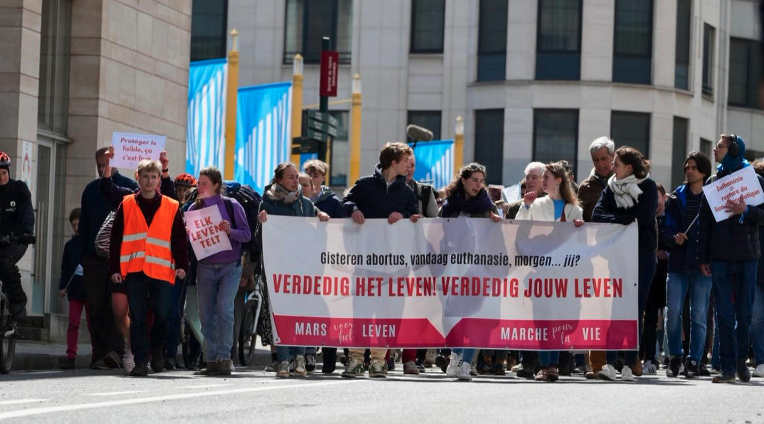
I had the honour to speak on Sunday 21 April this year, at the start of the March for Life 2024 in Brussels. I am a former biology teacher from the Netherlands and have taught, among other things, here in Brussels at the European Schools and in Flemish education. During my studies in the Netherlands, I discovered that ‘God exists’. I didn’t really know that until I was 23. That’s why later, here in Brussels, I also studied theology, philosophy and bioethics, to understand, as a biologist, how biology and religion are related and why, for example, abortion is not a good idea. Fifteen years ago I started ‘Biofides’, an apostolate for biology and faith. There I answer the big questions about life, including the bioethical questions we all face.

Let’s be clear: biologically, life doesn’t just begin at the moment of birth, or when the fetus can survive outside the womb. Also, life doesn’t start the moment the heart starts beating. Nor does human life begin only at the moment of implantation of the embryo in the uterine wall. You all know that human life begins, biologically speaking, at fertilization, when an egg is fertilized by a sperm cell.
So pregnancy doesn’t come out of the blue! You know that! I am the father of six children in my wife, who is taking part in the ‘Marche des Mères’ in Banneux today, and I know very well where pregnancy comes from! You too? This means that if we want to talk about abortion, we really need to talk about sexuality and fertility and about the ideal that every human embryo should be the fruit of a loving, lasting relationship that we traditionally call ‘marriage’. If we were responsible about sexuality and fertility, there would be no abortion issue! Shouldn’t we therefore give all our attention to ‘responsible parenting’, in order to combat the scourge of induced abortion? Is abortion not rather a symptom of a human and social tragedy that characterizes our time?
So let’s fight the ailment by looking at the cause! As far as I am concerned, it lies in the 1960s, the time of the sexual revolution, which in turn is caused, in my view, by the acceptance of contraception as a means of birth control. Sexual experience is separated from procreation, and sexuality thus becomes an end in itself. Today, we don’t even know what our sexual orientation is or our sex (or ‘gender’). The confusion is great! But contraception sometimes fails, or is even abortifacient, because the method, or its use, is not flawless. And then the need for abortion arises. The unwanted fetus will be removed. People even think they have a “right” to eliminate begotten human life!
We are dealing with a strong materialistic view of life. Since that sexual revolution, the Giver of life has almost completely disappeared from view. Life, whether it is sexuality or the human embryo, is not a gift from God but a material thing that can be manipulated to our own liking. There is no place for the ‘dignity’ of life in a materialistic worldview. Life is a ‘thing’ that you can do whatever you want. We no longer live in a ‘culture of life’ and believe that death, through abortion or euthanasia, is a justified solution to our problems. A materialistic culture thus becomes a ‘culture of death’.
We therefore live in a culture in which God and the gift of life must be rediscovered, and with it the dignity of human life, and of all life, including that of the unborn child. If you can see life as a gift from God, it will be easier for you to treat it with respect. I do not think that we can achieve this primarily by convincing the legislators and the political world, even though we have to work on that. After all, politics and legislation are a repercussion, a fruit of the prevailing culture. We must gradually change the culture, first of all by our example. Let’s make the world a better place and start with ourselves. Let us also love our “ideological enemies”: this is what the Gospel teaches. So we are not going to throw stones at abortionists or politicians, and even less at women who have chosen to have an abortion. Let’s help and be close to women who experience a problematic pregnancy, with a lot of love and understanding. Let us continue to stand up for our beliefs, our convictions, preferably with good arguments, but above all with a lot of love and understanding for our dissenting interlocutor.
Are we going to be able to change our current culture in the short term? No, let’s be realistic. It took Christianity three centuries to change the culture of the Romans. So we’re going to have to be patient with our contemporary culture. But we don’t sit back and relax. Let’s continue our march for life! Let’s go!
Vincent Kemme



